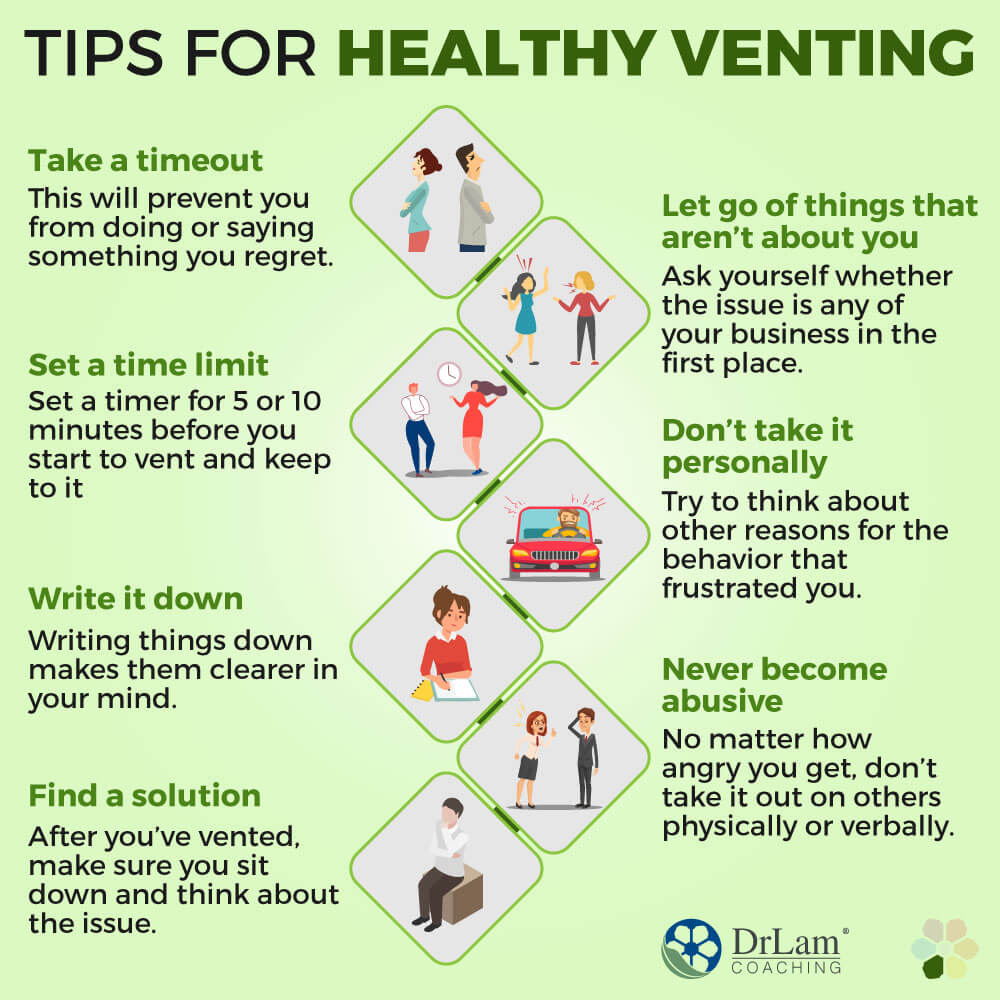 Life can be demanding, and sometimes you just lose your temper and end up yelling at people, often for very small offenses. This is not an ideal situation, particularly because it can cause bad feelings and sometimes even result in violence. However, it isn’t all bad. When you do it in the right way, these spikes of temper can be a type of venting therapy, a way for you to let off steam safely. Doing this can have a number of benefits for your body, your mood, and your stress levels, which will improve your health overall. But to enjoy these effects, you need to understand how to do this in the safest and most effective way.
Life can be demanding, and sometimes you just lose your temper and end up yelling at people, often for very small offenses. This is not an ideal situation, particularly because it can cause bad feelings and sometimes even result in violence. However, it isn’t all bad. When you do it in the right way, these spikes of temper can be a type of venting therapy, a way for you to let off steam safely. Doing this can have a number of benefits for your body, your mood, and your stress levels, which will improve your health overall. But to enjoy these effects, you need to understand how to do this in the safest and most effective way.
Everyone has complained to friends or family when they’re frustrated. When people or events annoy you, it’s natural to express those emotions to people who care about you and will listen, offer support, and even suggest possible solutions when necessary.
Venting therapy is a type of psychotherapy where you get support and can express your negative emotions so they don’t become bottled up and explode at inappropriate times.
But venting to others isn’t always a good thing. Some people vent all the time, about everything, frustrating their friends and family. Others vent to strangers and end up shouting at them in the middle of the street for real or imagined insults. And people who fall into these two categories tend to suffer a number of physical, social, emotional or mental consequences because of their tendencies.
The key is to prevent your venting and the negative thoughts associated with it from spiraling out of control or going on for too long.
Complaining to friends or family can have positive effects or negative effects on your body and your health, which is why venting therapy needs to be done properly.
The key is to vent constructively. When you complain in a constructive way it can strengthen your bonds and give you much needed emotional and mental support. In fact, it’s a big part of what connects people to each other, which is why friends and family usually take turns venting about the things that bother them. When you vent to trusted people, it also gives you a chance to benefit from their wisdom and their more detached point of view. This can give you access to a range of techniques and advice that you wouldn’t think about on your own.
Venting therapy is also a good technique for relieving stress. If you bottle up the things that bother you, it accumulates over time and can cause health problems such as high blood pressure and high blood sugar. These can be serious side effects of stress that will damage your body and cause a variety of diseases and disorders including Adrenal Fatigue Syndrome (AFS).
AFS is related to stress. Stress can be seriously damaging to your body and your health. It has been linked to issues such as heart disease, stroke, inflammation, and cancer as well as some mental disorders.
But prolonged periods of stress can also damage the systems in your body that are designed to help you cope with stress. When you’re under stress, your NeuroEndoMetabolic (NEM) Stress Response activates to protect your body and to prepare you to react to the stress. It causes changes in the body that assist with this. Your adrenal glands are an important part of this stress response because they excrete a number of hormones that are absolutely essential to your body’s functions. However, this system is meant to be a short-term solution, so when your stress is ongoing, it causes the system to become overworked.
This is particularly relevant because of the modern lifestyle, which often includes a variety of different, ongoing stressors. This may seem natural to your modern sensibilities, but to your body, it’s a major problem.
When you’re under stress for a long time, your adrenal glands can become fatigued because of the constant high demand for the hormones they excrete. When this occurs it can result in AFS, along with a variety of frustrating and vague symptoms that get worse over time. These symptoms can include fatigue, lethargy, anxiety, weight gain, digestive issues, and brain fog.
Unfortunately, because AFS isn’t commonly accepted by most of the medical establishment, this situation is likely to continue for a long time. When you go to the doctor with your complaints, they will probably offer tests which come back relatively normal, and then tell you that you’re just stressed and should take up meditation. This is not a helpful approach and can result in additional anxiety and worry that makes the situation worse and increases the load on your adrenal glands, making your symptoms worse.
 Negative thoughts make you feel bad, as if you’re being threatened in some way. This applies to all different types of negative thoughts, including anger, worry, anxiety or guilt. These emotions register in your body as stress, which causes a series of automatic responses. The stress causes the activation of your NEM Stress Response, which prompts the adrenals to release cortisol into your system to prepare your body for fight or flight. And if the negative thoughts occur repeatedly over time, this can result in an increased and ongoing demand for cortisol. This situation will eventually cause your adrenal glands to become fatigued and may result in AFS.
Negative thoughts make you feel bad, as if you’re being threatened in some way. This applies to all different types of negative thoughts, including anger, worry, anxiety or guilt. These emotions register in your body as stress, which causes a series of automatic responses. The stress causes the activation of your NEM Stress Response, which prompts the adrenals to release cortisol into your system to prepare your body for fight or flight. And if the negative thoughts occur repeatedly over time, this can result in an increased and ongoing demand for cortisol. This situation will eventually cause your adrenal glands to become fatigued and may result in AFS.
Negative thoughts or patterns of thinking can also exacerbate AFS if you already suffer from this disorder. Ongoing negative thoughts can cause a variety of physical, mental and emotional symptoms. These symptoms, even if they’re not a part of your AFS in the beginning, can negatively affect your health and result in chronic stress, which can exacerbate your AFS.
That’s why it’s important that you find a way to express and deal with your negative thoughts. Venting therapy can be a good way to do that. It gives you the chance to express yourself to someone who cares, to feel understood and supported in your struggles. This type of social connection is vital to the wellbeing of everyone, and when lacking, it can cause devastating health problems. So as long as you find healthy ways to vent, this can be an effective technique for healing your body.

Venting therapy can be good for you, but you need to do it properly because it can also be very destructive to many aspects of your life. The following ideas will help you vent in a way that isn’t a threat to your health or to the people around you:
 When dealing with out of control anger, it’s important that you take a timeout before you do anything. This will help prevent you from doing or saying something you regret, and can positively affect your venting as well. If you’re still really angry, it may be tempting to sit and shout at a friend or family member, venting your anger at them even if something else is to blame. But this is a destructive and unhealthy form of venting, and it isn’t very pleasant for the other person either. So before you vent, make sure you take a little time to calm yourself down. It will make the entire process much more controlled and beneficial.
When dealing with out of control anger, it’s important that you take a timeout before you do anything. This will help prevent you from doing or saying something you regret, and can positively affect your venting as well. If you’re still really angry, it may be tempting to sit and shout at a friend or family member, venting your anger at them even if something else is to blame. But this is a destructive and unhealthy form of venting, and it isn’t very pleasant for the other person either. So before you vent, make sure you take a little time to calm yourself down. It will make the entire process much more controlled and beneficial.
One of the problems with venting therapy is that it can easily go on for a long time. Once you start complaining about something, you tend to connect it to other troubles, repeat yourself, and get angrier the longer you talk about it. So if you really need to vent, set a timer for five or ten minutes before you start. And keep to it. This will encourage you to stay on track and express your emotions without exaggerating them or going over and over the issue verbally or in your mind.
When someone annoys us, we tend to take it personally. We decide that the other person deliberately took those actions to hurt or annoy us. This tendency causes you to think that another driver was deliberately trying to make you angry when they cut you off in traffic. But this isn’t usually the case. There are a number of reasons why that other driver might have cut you off. These reasons range from them not seeing you to the possibility that they have a sick family member in the back of the car and are rushing to the hospital. Ultimately, other people’s actions aren’t usually about you. This applies in most situations. So before you get angry, try to think about other reasons for the behavior that frustrated you.
 Writing things down makes them clearer in your mind, which is very helpful for venting therapy. It allows you to see the issue in all detail, and it forces you to slow down and process your thoughts. It highlights all the times you repeat yourself or come to a conclusion that may not be true, and it gives your friends and family a break from listening to you. If you find your mind spiraling wildly on an issue, going in faster circles with each rotation, consider writing about it.
Writing things down makes them clearer in your mind, which is very helpful for venting therapy. It allows you to see the issue in all detail, and it forces you to slow down and process your thoughts. It highlights all the times you repeat yourself or come to a conclusion that may not be true, and it gives your friends and family a break from listening to you. If you find your mind spiraling wildly on an issue, going in faster circles with each rotation, consider writing about it.
People have a tendency to think they’re the center of the world. This may be a natural way to think, but it also means that you take every problem or issue personally. You’ve probably seen people get personally angry when an issue isn’t any of their business and marveled at it. And you’ve probably done the same thing yourself. If you get angry because someone’s children are out of control in the shop, or because a workmate cheated on their partner, you’re guilty of this type of thinking. So before you get angry, or involve yourself, make sure you ask yourself whether the issue is any of your business in the first place.
This is vitally important. No matter how angry you get, you are not allowed to take it out on others physically or verbally. Name calling, cruel criticism, or physical violence will only hurt others, your relationships, and eventually your health as well. There is never a good reason for this. No excuses.
 Venting therapy isn’t really helpful if you don’t find a solution to the problem. Avoiding this step means that you’ll probably encounter the same situation again, and experience the same rush of anger and frustration. So after you’ve vented, make sure you sit down and think about the issue. Does it occur regularly? What can you do to avoid the same situation in the future? And if you can’t, how can you react differently next time? You can’t stop others from doing annoying things, but you can change how you react to them.
Venting therapy isn’t really helpful if you don’t find a solution to the problem. Avoiding this step means that you’ll probably encounter the same situation again, and experience the same rush of anger and frustration. So after you’ve vented, make sure you sit down and think about the issue. Does it occur regularly? What can you do to avoid the same situation in the future? And if you can’t, how can you react differently next time? You can’t stop others from doing annoying things, but you can change how you react to them.
If you’re the type of person who loses your temper at every little setback, your anger could get out of control and cause health and relationship problems. But the opposite, bottling everything up, isn’t good for your body, mind, or relationships either. Finding a safe and effective balance between these two extremes is the goal of venting therapy, a chance for you to express your negative emotions in a way that supports your mental, physical, and emotional health. Developing strategies for healthy venting will also lower your stress levels, which will be beneficial both for your overall health and for recovering from stress-related disorders such as AFS.
Everyone needs someone to talk to, a supportive person who will listen as you express your negative emotions. Venting can strengthen your relationships and help you to understand and even master your negative emotions. But to enjoy these effects, you have to vent in a healthy and effective way.
